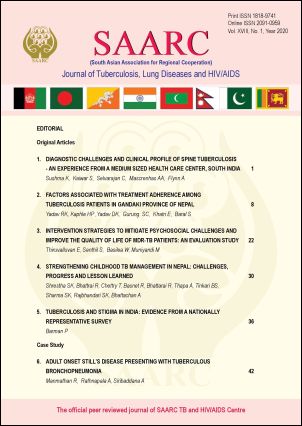Intervention Strategies to Mitigate Psychosocial Challenges and Improve the Quality of Life of MDR-TB Patients - An Evaluation Study
DOI:
https://doi.org/10.3126/saarctb.v18i1.34132Keywords:
MDR-TB patients, intervention strategy, Quality of life, treatment adherenceAbstract
Introduction: The psychosocial well-being and treatment outcome in MDR-TB is far undesirable as the treatment is characterized by a rigorous treatment regimen for a long duration, adverse side effects, lower cure rate, and high treatment costs. This study aimed to devise an intervention strategy and test its feasibility and effectiveness to ensure the patients’ quality of life (QOL) and to promote adherence.
Methodology: The study population included all MDR-TB patients, of age 18 years and above registered in 16 tuberculosis units (TUs) under Chennai Corporation for treatment during the year 2014. Researchers have devised an intervention strategy package that included motivational interview (MI) module, counseling support as well as nutritional support. Participants were included in the study after getting informed consent. Motivational interviewing was offered at five times during the study period. Each participant received minimum 15 individual counselling sessions. All participants but two received nutritional flour packet weighing half kilogram every month.
Results: Of 35 participants enrolled in the study, one third was women. Poor QOL was experienced by 19 participants out of 35 at the start of treatment that came down to 2 after the study. QOL scores in all four domains were significantly high and depression level score was significantly lowered at the end of the treatment. At the start of the treatment twenty, four out of thirty-five participants were dissatisfied with their health that came down to five at the end of treatment.
Conclusion: Intervention strategy not only had a great impact on the QOL of study participants but also contributed to better treatment adherence and desirable treatment outcome. Therefore, researchers emphasize the need to adopt this Intervention Strategy through the provision of trained, professional MDR-TB counsellors. Further, larger studies of multi-state/ multi-site may be taken up to standardize the intervention strategies adopted in this study.
Downloads
Downloads
Published
How to Cite
Issue
Section
License
Copyright © SAARC Tuberculosis and HIV/AIDS Centre (STAC), all rights reserved, no part of this publication may be reproduced, stored in a retrieval system or transmitted in any form or by any means without prior permission of the STAC.




